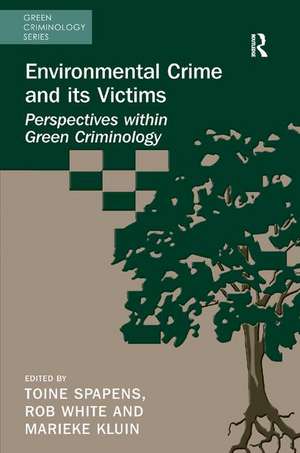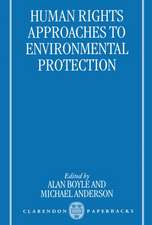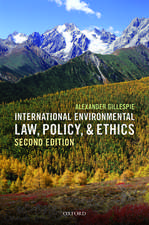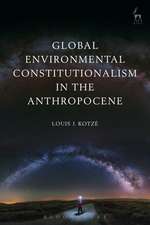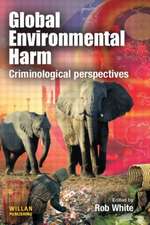Environmental Crime and its Victims: Perspectives within Green Criminology: Green Criminology
Editat de Toine Spapens, Rob White, Marieke Kluinen Limba Engleză Hardback – 28 aug 2014
| Toate formatele și edițiile | Preț | Express |
|---|---|---|
| Paperback (1) | 489.26 lei 6-8 săpt. | |
| Taylor & Francis – 9 ian 2017 | 489.26 lei 6-8 săpt. | |
| Hardback (1) | 1005.01 lei 6-8 săpt. | |
| Taylor & Francis – 28 aug 2014 | 1005.01 lei 6-8 săpt. |
Preț: 1005.01 lei
Preț vechi: 1225.61 lei
-18% Nou
Puncte Express: 1508
Preț estimativ în valută:
192.32€ • 205.64$ • 160.34£
192.32€ • 205.64$ • 160.34£
Carte tipărită la comandă
Livrare economică 17 aprilie-01 mai
Preluare comenzi: 021 569.72.76
Specificații
ISBN-13: 9781472422781
ISBN-10: 1472422783
Pagini: 320
Ilustrații: Includes 23 b&w illustrations
Dimensiuni: 156 x 234 x 19 mm
Greutate: 0.59 kg
Ediția:New ed
Editura: Taylor & Francis
Colecția Routledge
Seria Green Criminology
Locul publicării:Oxford, United Kingdom
ISBN-10: 1472422783
Pagini: 320
Ilustrații: Includes 23 b&w illustrations
Dimensiuni: 156 x 234 x 19 mm
Greutate: 0.59 kg
Ediția:New ed
Editura: Taylor & Francis
Colecția Routledge
Seria Green Criminology
Locul publicării:Oxford, United Kingdom
Notă biografică
Toine Spapens is Professor of Criminology at Tilburg University, the Netherlands, and part-time Professor of Environmental Crime, the Police Academy of the Netherlands. His research interests are in environmental crime, organized crime, regulatory issues and international police and judicial cooperation. Rob White is Professor of Criminology in the School of Social Sciences, University of Tasmania, Australia. He has written widely in the areas of criminology and youth studies, and has a particular interest in issues related to environmental harm, ecological justice and green criminology. Marieke Kluin is a PhD Researcher at Delft Technical University, Safety Science Group. Her doctoral research with the working title ’Compliance and rule violation in the chemical industry’ focuses on the relationship between rule violation, compliance, organizational criminology, and safety in the chemical industry.
Recenzii
’This is an excellent collection that brings together leading scholars in the field of green criminology. The prominence given to questions of harm and justice in the way we conceptualise environmental crimes is a valuable contribution to public debate as is the much-needed corrective to assumptions that these practices are victimless.’ Lorraine Elliott, Australian National University ’This book contains thought-provoking perspectives drawn from theory and practice on a persisting global problem: environmental crime. In addition to important insights on villains and victims, it provides new ideas on what should be considered an environmental crime as well as practical experiences in combatting it. Its multiple perspectives and innovative research questions make it a valuable resource for anyone interested in the topic, not just criminologists.’ Christiane Gerstetter, Ecologic Institute, Germany and EFFACE research project (www.efface.eu) ’A pioneering work in the new and rapidly developing field of green criminology, this book presents and explores in a well-structured, succinct and lucid manner various factors which set green crime apart from the conventional areas of criminal law and criminology. It explores the many challenges and factors not prevalent in traditional criminal law, and will be of value not only to academic criminal lawyers and criminologists but also administrators and members of the police force; including those involved in the enforcement of transnational environmental crime.’ Jan Glazewski, Institute of Marine & Environmental Law, University of Cape Town, South Africa ’This book provides a state-of-the-art overview of current issues of the perpetration and victimization of environmental crime in a globalized world. From pollution, e-waste, emission fraud to wildlife crime, the book grasps the many manifestations, assesses the harms, and gives direction for the policing and prevention of environmental crime. This boo
Cuprins
Introduction; I: Examining the Crime and the Victimization Problem; 1: The Criminogenic Effects of Environmental Harm: Bringing a ‘Green' Perspective to Mainstream Criminology; 2: Climate Change: A State-corporate Crime Perspective; 3: The Corporation as Villain and Victim: Reflections on Privilege, Complicity, Awareness, and Accountability; 4: Environmental Victims and Criminal Justice: Proceed with Caution; 5: Eco-justice and Problem-solving Approaches to Environmental Crime and Victimisation; 6: Victims of Environmental Crime: Routes for Recognition, Restitution and Redress; II: Characteristics of Different Types of Environmental Crime; 7: Trade in ‘Dirty Air': Carbon Crime and the Politics of Pollution; 8: Oil Spills: A Persistent Problem; 9: A Decade of Violations in the Dutch Chemical Industry; 10: Illegal E-waste Transports: Exploring their Harmfulness, Scale, Social Organization and Governance; 11: Camouflage-collar Crime: An Examination of Wildlife Crime and Characteristics of Offenders in Florida; 12: On the Relationship between Animal Victimization and Stigmatization of Ethnic Groups: The Case of Ritual Slaughter; III: Combating Environmental Crime; 13: Invisible Victims: the Problem of Policing Environmental Crime; 14: Project LEAF, and Interpol's Work on Illegal Logging and Forest Crime; 15: Communities as Victims of Environmental Crime: Lessons from the Field; 16: The Treadmill of Production, Planetary Boundaries and Green Criminology; 17: Assessing the Partner and Media Engagement with the International Consortium on Combating Wildlife Crime
Descriere
This book provides a diverse and provocative array of arguments, critiques and recommendations from leading researchers and scholars in the field of green criminology. The issues addressed are three-fold: the specific characteristics of some of the major types of environmental crime and its perpetrators; the problem of victimization in cases of environmental crime; and the question of how to tackle this problem. These topics are approached from the point of view of green criminological theory, sociology, law enforcement, community wellbeing, environmental activism and victimology.
